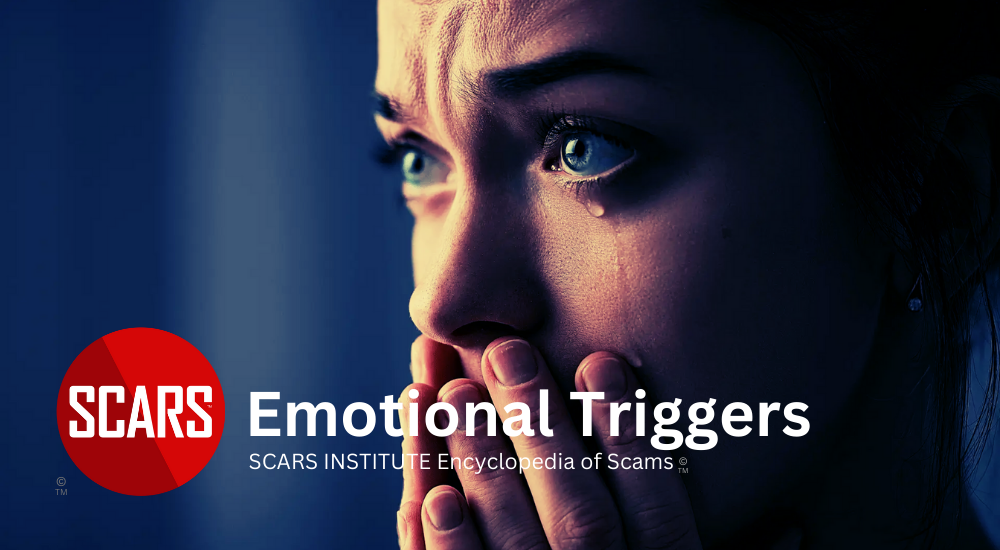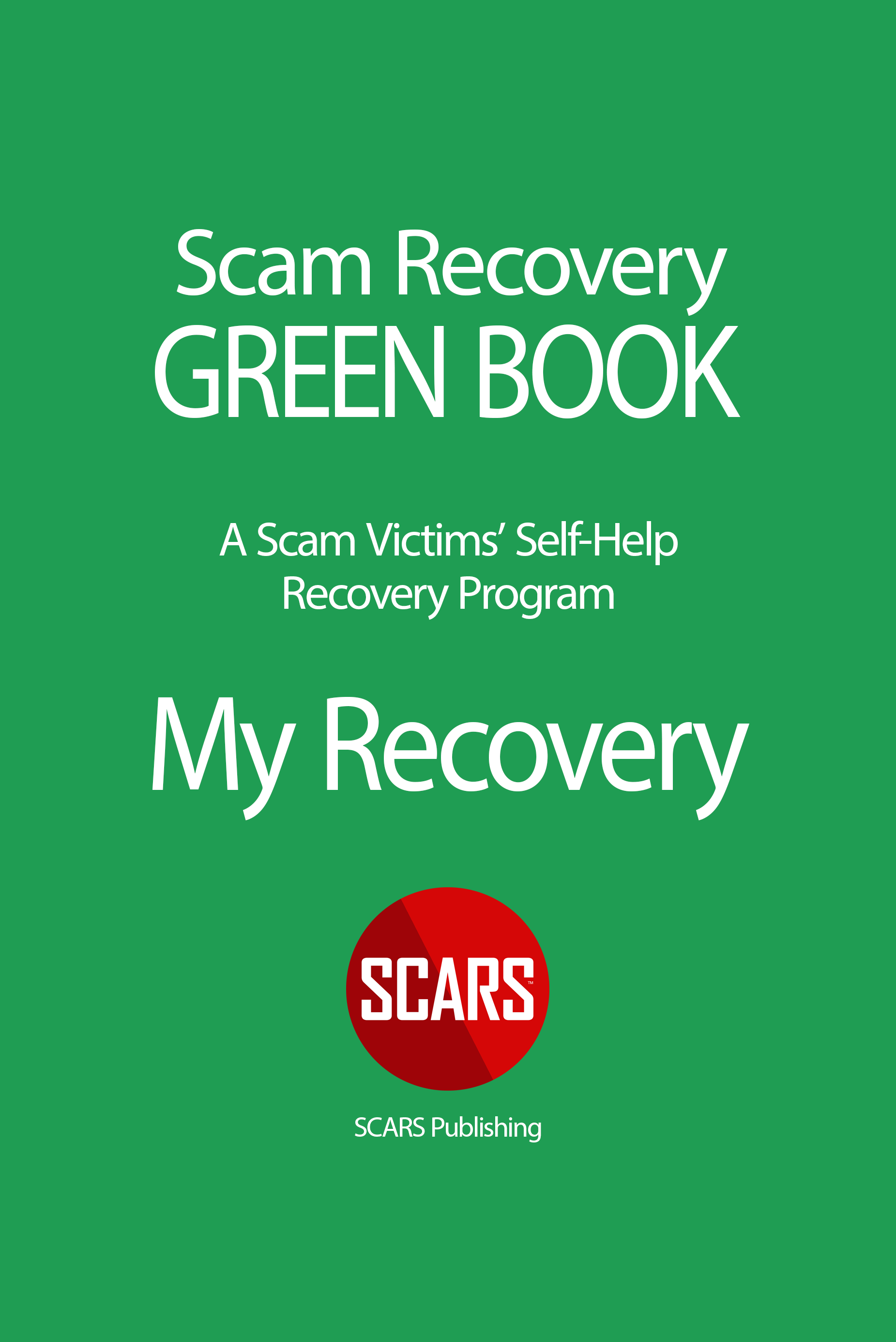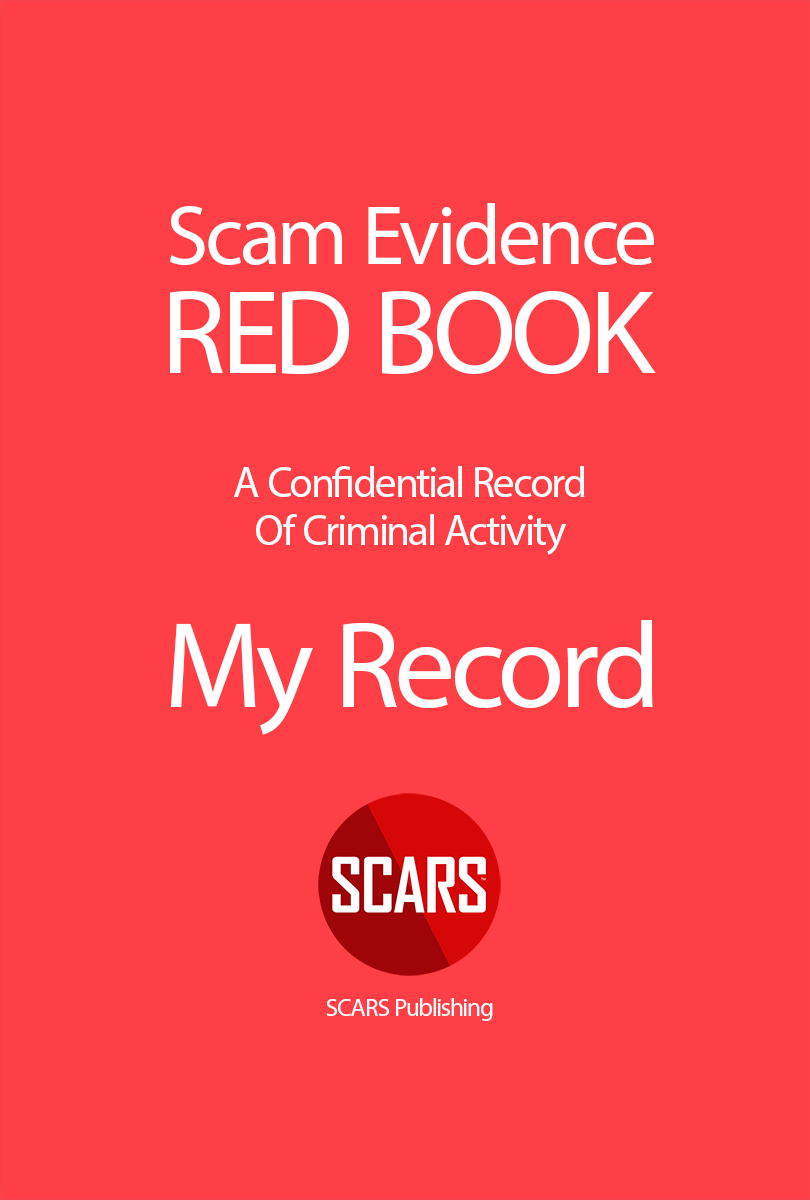
SCARS Institute’s Encyclopedia of Scams™ Published Continuously for 25 Years

Helping Scam Victims Let Go of Collecting and Exposing Fake Profiles
Understanding the Obsessive-Compulsive Nature of Collecting and Exposing Fake Profiles
Helping Scam Victims Understand the Harm they may be doing to Themselves by Obsessive-Compulsive activities
Scam Victim Recovery Psychology – A SCARS Institute Insight
Author:
• Tim McGuinness, Ph.D., DFin, MCPO, MAnth – Anthropologist, Scientist, Director of the Society of Citizens Against Relationship Scams Inc.
Article Abstract
Scam victims often develop obsessive-compulsive behaviors centered around exposing fake profiles on social media, driven by a deep need for justice and control after their traumatic experiences. This behavior is reinforced by the brain’s reward system, where identifying and exposing scammers releases dopamine, creating a temporary sense of satisfaction. However, this cycle can be harmful, leading to increased stress, disrupted daily life, and strained relationships. Breaking free from this compulsion requires conscious effort, including setting boundaries, seeking professional help, and focusing on self-care to prioritize recovery and mental health.

The Obsessive-Compulsive Nature of Scam Victims: A Deep Dive into Collecting and Exposing Fake Profiles
In the aftermath of a scam, many victims find themselves driven by a compulsive need to expose the criminals who deceived them. This often manifests in the obsessive collection, organization, and exposure of fake profiles used by scammers on social media. While this behavior can be seen as a form of coping or seeking justice, it can also reflect underlying neurological and psychological processes that drive compulsive behaviors.
The Brain’s Role in Obsessive Behavior
Several parts of the brain are involved in organizing, collecting, and categorizing information—key activities in the exposure of fake profiles. The prefrontal cortex, hippocampus, and parietal lobes are central to these functions.
Prefrontal Cortex: This area of the brain is involved in executive functions like planning, decision-making, and impulse control. It plays a crucial role in the meticulous planning and organization required to track down and expose fake profiles. However, when this area becomes overly engaged or dysfunctional, it can lead to obsessive behaviors, where the individual feels compelled to continue their activities even when they become excessive.
Hippocampus: The hippocampus is responsible for memory and learning. In the context of scam victims, it reinforces the habit of collecting and organizing information about scammers. Every time a victim successfully identifies a fake profile, the hippocampus reinforces the memory pathway, making the behavior more habitual and potentially compulsive.
Parietal Lobes: These lobes assist with spatial awareness and the physical organization of objects. For scam victims, this translates into the detailed organization of information about fake profiles—such as categorizing profiles by patterns, locations, or the types of scams used.
Obsessive Behavior and the Reward System
One of the critical factors driving these obsessive behaviors is the brain’s reward system, particularly the involvement of dopamine in the nucleus accumbens. Every time a scam victim successfully identifies and exposes a fake profile, the brain releases dopamine, creating a sense of satisfaction and achievement. This release of dopamine reinforces the behavior, making the victim feel compelled to continue their efforts.
This cycle can become particularly intense, leading to an obsessive focus on collecting and exposing fake profiles. The satisfaction derived from these activities can make it difficult for the individual to stop, even when it interferes with other aspects of their life.
The Impact of Trauma on Compulsive Behavior
The traumatic experience of being scammed can also contribute to the development of compulsive behaviors. Trauma can disrupt normal brain functions, leading to heightened activity in areas like the amygdala (which processes fear and anxiety) and the prefrontal cortex. This disruption can make it challenging for scam victims to manage their emotions and impulses, resulting in behaviors that are more obsessive.
Moreover, the need to regain control after a traumatic event like a scam can drive victims to engage in activities that give them a sense of power or agency. For many, exposing fake profiles becomes a way to reclaim control and seek justice, even if the behavior becomes compulsive.
The Harm of Obsessive-Compulsive Behavior in Scam Victims
While the obsessive collection and exposure of fake profiles may seem like a form of justice or an attempt to regain control after being scammed, this behavior can be harmful to scam victims in several significant ways. The compulsive nature of these activities can have detrimental effects on mental health, relationships, and overall well-being.
Mental Health Impacts
One of the most concerning effects of obsessive-compulsive behavior in scam victims is its impact on mental health. The relentless focus on identifying and exposing fake profiles can exacerbate feelings of anxiety, stress, and depression. Instead of moving forward with their lives, victims may find themselves trapped in a cycle of negative emotions, constantly reliving the trauma of being scammed.
This constant engagement in obsessive behaviors can lead to chronic stress, which negatively impacts both mental and physical health. Chronic stress can weaken the immune system, increase the risk of cardiovascular diseases, and contribute to sleep disorders, among other issues. Moreover, it can also intensify symptoms of post-traumatic stress disorder (PTSD), making recovery from the initial trauma even more challenging.
Disruption of Daily Life
Obsessive-compulsive behaviors often take up significant amounts of time and mental energy, disrupting daily life and routines. Scam victims who become consumed by these activities may neglect other important aspects of their lives, such as work, family, and personal well-being. This neglect can lead to a deterioration in quality of life, with victims becoming increasingly isolated and withdrawn.
The focus on exposing fake profiles can also lead to burnout, where the victim feels emotionally and physically exhausted from their efforts. Burnout can exacerbate feelings of hopelessness and despair, making it difficult for the victim to engage in other activities that could aid in their recovery.
Strain on Relationships
Obsessive-compulsive behavior can also strain relationships with family and friends. Loved ones may become concerned about the victim’s fixation on exposing scammers, especially if it leads to neglect of relationships or a lack of engagement in other social activities. This strain can lead to conflict, misunderstanding, and even further isolation, as the victim may feel that no one understands their need to seek justice.
The victim’s preoccupation with scam-related activities may also make it difficult for them to connect emotionally with others. This emotional distance can erode the support systems that are crucial for recovery, leaving the victim feeling even more alone in their struggle.
Hindrance to Recovery
Perhaps the most significant harm of obsessive-compulsive behavior is its potential to hinder the victim’s recovery. Recovery from trauma requires time, patience, and often professional help. However, when a victim is fixated on exposing fake profiles, they may be unable to fully engage in the therapeutic process. Instead of focusing on healing and moving forward, they remain stuck in a cycle of reliving the trauma.
This fixation can also prevent victims from developing healthy coping mechanisms. Rather than learning to manage their emotions in a constructive way, they may become reliant on their obsessive behaviors as a way to cope with their feelings of anger, betrayal, and hurt. This reliance can prevent them from developing the resilience needed to overcome their trauma and rebuild their lives.
How to Break Free of the Never Ending Fake Profile Exposing Compulsion
Breaking free from the obsessive-compulsive need to expose fake profiles after being scammed is crucial for the well-being of scam victims. While it’s natural to want to seek justice and prevent others from falling into the same traps, the endless cycle of exposing scammers can have harmful effects on mental health and hinder the recovery process. Here are some strategies to help victims break free from this harmful cycle:
Recognize the Harmful Impact
Understanding how obsessive behaviors are affecting your mental and physical health is the first step toward breaking free. Acknowledge that constant exposure to the frustration of endless criminality can lead to chronic stress, anxiety, and even more serious symptoms of trauma, such as PTSD. Recognizing these impacts can motivate you to seek healthier coping mechanisms.
Set Boundaries for Online Activity
Limiting the time spent on activities related to exposing fake profiles is essential. Set clear boundaries for yourself, such as specific time limits each day for online activity related to scams. Use timers or apps that block certain websites after a set period to help enforce these boundaries.
Focus on Healing and Self-Care
Shifting your focus from the external task of exposing scammers to the internal process of healing is crucial. Engage in self-care activities that promote relaxation and emotional well-being, such as meditation, exercise, or spending time with loved ones. Prioritize activities that make you feel grounded and present, rather than those that keep you fixated on past trauma.
Start leaning at www.ScamVictimsSupprt.org and continue by enrolling in the free SCARS Institute Scam Survivor’s School at www.SCARSeducation.org
Seek Professional Help
Engaging in therapy can be incredibly beneficial. Cognitive-behavioral therapy (CBT) is particularly effective in helping individuals manage obsessive-compulsive behaviors by challenging and changing the thought patterns that drive these actions. A therapist can also provide tools to cope with the emotional fallout of being scammed and guide you in developing healthier coping strategies.
Find a licensed trauma counselor at counseling.AgainstScams.org
Join a SCARS Institute Group
Connecting with others who have experienced similar situations can provide valuable support and perspective. Support groups, such as those offered by organizations like SCARS (Society of Citizens Against Relationship Scams), allow victims to share their experiences and learn from others who are also working through their recovery. These groups can offer a sense of community and reduce feelings of isolation.
Sign up for SCARS Institute free services at support.AgainstScams.org
Shift Focus to Awareness and Education
If you feel a strong need to contribute to the fight against scams, consider redirecting your efforts toward raising awareness and educating others. This can be done through writing, speaking, or volunteering with organizations that support scam victims. By focusing on prevention and education rather than direct confrontation with scammers, you can contribute in a positive way without exposing yourself to the same level of emotional distress.
Develop Healthy Distractions
Finding new hobbies or interests that bring joy and fulfillment can help break the cycle of obsessive behavior. Engaging in creative activities, sports, or learning something new can shift your focus away from the negative and toward positive, life-affirming experiences.
Practice Mindfulness and Grounding Techniques
Mindfulness practices, such as deep breathing exercises or meditation, can help you stay present and reduce the compulsive urge to engage in exposing scammers. Grounding techniques, like focusing on the physical sensations around you, can help when you feel overwhelmed or triggered by thoughts of the scam.
Acknowledge the Limitations
Understand that while exposing fake profiles may provide a temporary sense of control, it is not a long-term solution. Scammers are constantly evolving, and the scope of the problem is far larger than any one person can tackle. Acknowledging this can help you let go of the need to constantly engage in these activities.
Celebrate Small Wins
Recognize and celebrate your progress, no matter how small. Every step you take toward reducing obsessive behavior is a victory. Reward yourself for setting boundaries, seeking help, and focusing on your healing journey.
Summary
While the obsessive collection and exposure of fake profiles by scam victims can be seen as a form of coping, it is essential to recognize the underlying neurological and psychological factors at play. The involvement of brain regions like the prefrontal cortex, hippocampus, and parietal lobes, combined with the brain’s reward system, can lead to compulsive behaviors that are difficult to manage.
While the desire to expose scammers is understandable, especially for those who have been deeply hurt by these crimes, it’s important to recognize the potential harms of obsessive-compulsive behavior. This behavior can exacerbate mental health issues, disrupt daily life, strain relationships, and hinder recovery. Scam victims should be encouraged to seek professional help and focus on their healing journey, rather than becoming consumed by the pursuit of justice. By doing so, they can regain control over their lives and move forward in a healthier, more balanced way.
Breaking free from the obsessive-compulsive need to expose fake profiles requires a conscious effort to prioritize your mental health and recovery. By setting boundaries, seeking support, and focusing on healing, you can regain control of your life and move forward in a healthier, more balanced way. Remember that recovery is a journey, and it’s okay to seek help along the way.
Understanding these processes can help scam victims recognize when their behavior is becoming harmful and seek support if needed. Therapy and self-care practices can help victims manage these compulsive behaviors and find healthier ways to cope with their trauma. Ultimately, while the desire to expose scammers is understandable, it is crucial for victims to prioritize their mental health and well-being.
A Note About Labeling!
We often use the term ‘scam victim’ in our articles, but this is a convenience to help those searching for information in search engines like Google. It is just a convenience and has no deeper meaning. If you have come through such an experience, YOU are a Survivor! It was not your fault. You are not alone! Axios!
Statement About Victim Blaming
SCARS Institute articles examine different aspects of the scam victim experience, as well as those who may have been secondary victims. This work focuses on understanding victimization through the science of victimology, including common psychological and behavioral responses. The purpose is to help victims and survivors understand why these crimes occurred, reduce shame and self-blame, strengthen recovery programs and victim opportunities, and lower the risk of future victimization.
At times, these discussions may sound uncomfortable, overwhelming, or may be mistaken for blame. They are not. Scam victims are never blamed. Our goal is to explain the mechanisms of deception and the human responses that scammers exploit, and the processes that occur after the scam ends, so victims can better understand what happened to them and why it felt convincing at the time, and what the path looks like going forward.
Articles that address the psychology, neurology, physiology, and other characteristics of scams and the victim experience recognize that all people share cognitive and emotional traits that can be manipulated under the right conditions. These characteristics are not flaws. They are normal human functions that criminals deliberately exploit. Victims typically have little awareness of these mechanisms while a scam is unfolding and a very limited ability to control them. Awareness often comes only after the harm has occurred.
By explaining these processes, these articles help victims make sense of their experiences, understand common post-scam reactions, and identify ways to protect themselves moving forward. This knowledge supports recovery by replacing confusion and self-blame with clarity, context, and self-compassion.
Additional educational material on these topics is available at ScamPsychology.org – ScamsNOW.com and other SCARS Institute websites.
Psychology Disclaimer:
All articles about psychology and the human brain on this website are for information & education only
The information provided in this article is intended for educational and self-help purposes only and should not be construed as a substitute for professional therapy or counseling.
While any self-help techniques outlined herein may be beneficial for scam victims seeking to recover from their experience and move towards recovery, it is important to consult with a qualified mental health professional before initiating any course of action. Each individual’s experience and needs are unique, and what works for one person may not be suitable for another.
Additionally, any approach may not be appropriate for individuals with certain pre-existing mental health conditions or trauma histories. It is advisable to seek guidance from a licensed therapist or counselor who can provide personalized support, guidance, and treatment tailored to your specific needs.
If you are experiencing significant distress or emotional difficulties related to a scam or other traumatic event, please consult your doctor or mental health provider for appropriate care and support.
Also read our SCARS Institute Statement about Professional Care for Scam Victims – click here to go to our ScamsNOW.com website.
If you are in crisis, feeling desperate, or in despair please call 988 or your local crisis hotline.
-/ 30 /-
What do you think about this?
Please share your thoughts in a comment below!
Table of Contents
- Understanding the Obsessive-Compulsive Nature of Collecting and Exposing Fake Profiles
- Article Abstract
- The Obsessive-Compulsive Nature of Scam Victims: A Deep Dive into Collecting and Exposing Fake Profiles
- The Brain’s Role in Obsessive Behavior
- Obsessive Behavior and the Reward System
- The Impact of Trauma on Compulsive Behavior
- The Harm of Obsessive-Compulsive Behavior in Scam Victims
- How to Break Free of the Never Ending Fake Profile Exposing Compulsion
- Summary
- A Note About Labeling!
LEAVE A COMMENT?
Recent Comments
On Other Articles
- Arwyn Lautenschlager on Love Bombing And How Romance Scam Victims Are Forced To Feel: “I was love bombed to the point that I would do just about anything for the scammer(s). I was told…” Feb 11, 14:24
- on Dani Daniels (Kira Lee Orsag): Another Scammer’s Favorite: “You provide a valuable service! I wish more people knew about it!” Feb 10, 15:05
- on Danielle Delaunay/Danielle Genevieve – Stolen Identity/Stolen Photos – Impersonation Victim UPDATED 2024: “We highly recommend that you simply turn away form the scam and scammers, and focus on the development of a…” Feb 4, 19:47
- on The Art Of Deception: The Fundamental Principals Of Successful Deceptions – 2024: “I experienced many of the deceptive tactics that romance scammers use. I was told various stories of hardship and why…” Feb 4, 15:27
- on Danielle Delaunay/Danielle Genevieve – Stolen Identity/Stolen Photos – Impersonation Victim UPDATED 2024: “Yes, I’m in that exact situation also. “Danielle” has seriously scammed me for 3 years now. “She” (he) doesn’t know…” Feb 4, 14:58
- on An Essay on Justice and Money Recovery – 2026: “you are so right I accidentally clicked on online justice I signed an agreement for 12k upfront but cd only…” Feb 3, 08:16
- on The SCARS Institute Top 50 Celebrity Impersonation Scams – 2025: “Quora has had visits from scammers pretending to be Keanu Reeves and Paul McCartney in 2025 and 2026.” Jan 27, 17:45
- on Scam Victims Should Limit Their Exposure To Scam News & Scammer Photos: “I used to look at scammers photos all the time; however, I don’t feel the need to do it anymore.…” Jan 26, 23:19
- on After A Scam, No One Can Tell You How You Will React: “This article was very informative, my scams happened 5 years ago; however, l do remember several of those emotions and/or…” Jan 23, 17:17
- on Situational Awareness and How Trauma Makes Scam Victims Less Safe – 2024: “I need to be more observant and I am practicing situational awareness. I’m saving this article to remind me of…” Jan 21, 22:55
ARTICLE META
Important Information for New Scam Victims
- Please visit www.ScamVictimsSupport.org – a SCARS Website for New Scam Victims & Sextortion Victims
- Enroll in FREE SCARS Scam Survivor’s School now at www.SCARSeducation.org
- Please visit www.ScamPsychology.org – to more fully understand the psychological concepts involved in scams and scam victim recovery
If you are looking for local trauma counselors please visit counseling.AgainstScams.org or join SCARS for our counseling/therapy benefit: membership.AgainstScams.org
If you need to speak with someone now, you can dial 988 or find phone numbers for crisis hotlines all around the world here: www.opencounseling.com/suicide-hotlines
A Note About Labeling!
We often use the term ‘scam victim’ in our articles, but this is a convenience to help those searching for information in search engines like Google. It is just a convenience and has no deeper meaning. If you have come through such an experience, YOU are a Survivor! It was not your fault. You are not alone! Axios!
A Question of Trust
At the SCARS Institute, we invite you to do your own research on the topics we speak about and publish, Our team investigates the subject being discussed, especially when it comes to understanding the scam victims-survivors experience. You can do Google searches but in many cases, you will have to wade through scientific papers and studies. However, remember that biases and perspectives matter and influence the outcome. Regardless, we encourage you to explore these topics as thoroughly as you can for your own awareness.
Statement About Victim Blaming
SCARS Institute articles examine different aspects of the scam victim experience, as well as those who may have been secondary victims. This work focuses on understanding victimization through the science of victimology, including common psychological and behavioral responses. The purpose is to help victims and survivors understand why these crimes occurred, reduce shame and self-blame, strengthen recovery programs and victim opportunities, and lower the risk of future victimization.
At times, these discussions may sound uncomfortable, overwhelming, or may be mistaken for blame. They are not. Scam victims are never blamed. Our goal is to explain the mechanisms of deception and the human responses that scammers exploit, and the processes that occur after the scam ends, so victims can better understand what happened to them and why it felt convincing at the time, and what the path looks like going forward.
Articles that address the psychology, neurology, physiology, and other characteristics of scams and the victim experience recognize that all people share cognitive and emotional traits that can be manipulated under the right conditions. These characteristics are not flaws. They are normal human functions that criminals deliberately exploit. Victims typically have little awareness of these mechanisms while a scam is unfolding and a very limited ability to control them. Awareness often comes only after the harm has occurred.
By explaining these processes, these articles help victims make sense of their experiences, understand common post-scam reactions, and identify ways to protect themselves moving forward. This knowledge supports recovery by replacing confusion and self-blame with clarity, context, and self-compassion.
Additional educational material on these topics is available at ScamPsychology.org – ScamsNOW.com and other SCARS Institute websites.
Psychology Disclaimer:
All articles about psychology and the human brain on this website are for information & education only
The information provided in this article is intended for educational and self-help purposes only and should not be construed as a substitute for professional therapy or counseling.
While any self-help techniques outlined herein may be beneficial for scam victims seeking to recover from their experience and move towards recovery, it is important to consult with a qualified mental health professional before initiating any course of action. Each individual’s experience and needs are unique, and what works for one person may not be suitable for another.
Additionally, any approach may not be appropriate for individuals with certain pre-existing mental health conditions or trauma histories. It is advisable to seek guidance from a licensed therapist or counselor who can provide personalized support, guidance, and treatment tailored to your specific needs.
If you are experiencing significant distress or emotional difficulties related to a scam or other traumatic event, please consult your doctor or mental health provider for appropriate care and support.
Also read our SCARS Institute Statement about Professional Care for Scam Victims – click here to go to our ScamsNOW.com website.


















Thank you for your comment. You may receive an email to follow up. We never share your data with marketers.